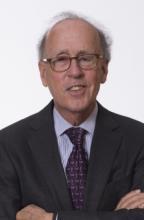Nathan Gardels interviews Joseph Stiglitz about Wall Street meltdown
Joseph Stiglitz was awarded the Nobel Prize for Economics in 2001. I spoke with him on Tuesday (Editor's note September 16, 2008) about the Wall Street meltdown.
Nathan Gardels: Barack Obama has said the Wall Street meltdown is the greatest financial crisis since the Great Depression. John McCain says the economy is threatened, but fundamentally strong. Which is it?
Joseph Stiglitz: Obama is much closer to the mark. Yes, America has talented people, great universities and a good hi-tech sector. But the financial markets have played a very important role, accounting for 30 percent of corporate profits in the last few years.
Those who run the financial markets have garnered those profits on the argument they were helping manage risk and efficiently allocating capital, which is why, they said, they "deserved" those high returns.
That's been shown to be not true. They've managed it all badly. Now it has come back to bite them and now the rest of the economy will pay as the wheels of commerce slow because of the credit crunch. No modern economy can function well without a vibrant financial sector.
So, Obama's diagnosis that our financial sector is in desperate shape is correct. And if it is in desperate shape, that means our economy is in desperate shape.
Even if we weren't looking at the financial turmoil, but at the level of household, national and federal debt there is a major problem. We are drowning. If we look at inequality, which is the greatest since the Great Depression, there is a major problem. If we look at stagnating wages, there is a major problem.
Most of the economic growth we've had in the past five years was based on the housing bubble, which has now burst. And the fruits of that growth have not been shared widely. In short, the fundamentals are not strong.
Gardels: What ought to be the policy response to the Wall Street meltdown?
Stiglitz: Clearly, we need not only re-regulation, but a redesign of the regulatory system. During his reign as head of the Federal Reserve in which this mortgage and financial bubble grew, Alan Greenspan had plenty of instruments to use to curb it, but failed. He was chosen by Ronald Reagan, after all, because of his anti-regulation attitudes.
Paul Volcker, the previous Fed Chairman known for keeping inflation under control, was fired because the Reagan administration didn't believe he was an adequate de-regulator. Our country has thus suffered from the consequences of choosing as regulator-in-chief of the economy someone who didn't believe in regulation.
So, first, to correct the problem we need political leaders and policymakers who believe in regulation. Beyond that, we need to put in place a new system that can cope with the expansion of finance and financial instruments beyond traditional banks.
For example, we need to regulate incentives. Bonuses need to be paid on multiyear performance instead of one year, which is an encouragement to gambling. Stock options encourage dishonest accounting and need to be curbed. In short, we built incentives for bad behavior in the system, and we got it.
We also need "speed bumps." Every financial crisis historically has been associated with the very rapid expansion of particular kinds of assets, from tulips to mortgages. If you dampen that, you can stop the bubbles from getting out of control. The world wouldn't disappear if we expanded mortgages at 10 percent a year instead of 25 percent a year. We know the pattern so well we ought to be able to do something to curtail it.
Above all, we need a financial product safety commission just like we have for consumer goods. The financiers were inventing products not intended to manage risk but to create risk.
Of course, I believe strongly in greater transparency. Yet, in terms of regulatory standards, these products were transparent in a technical sense. They were just so complex no one could understand them. If every provision in these contracts were made public, it wouldn't have added any useful information about the risk to any mortal person.
Too much information is no information. In this sense, those calling for more disclosure as the solution to the problem don't understand information.
If you are buying a product, you want to know the risk, pure and simple. That is the issue.
Gardels: The mortgage-backed securities behind the meltdown are held across the world by banks or sovereign funds in China, Japan, Europe and the Gulf. What impact will this crisis have on them?
Stiglitz: That is true. The losses of European financial institutions over sub-prime mortgages have been greater than in the U.S.
The fact that the U.S. diversified these mortgage-backed securities to holders around the world -- thanks to globalization of markets -- has actually softened the impact on the U.S. itself. If we hadn't spread the risk around the whole world, the downturn in the U.S. would be much worse.
One thing that is now being understood as a result of this crisis is the information asymmetries of globalization. In Europe, for example, it was little understood that U.S. mortgages are non-recourse mortgages -- if the value of the house becomes less than the value of the mortgage, you can turn the key over to the bank and walk away. In Europe, the house is collateral, but the borrower remains on the hook for the amount he borrowed no matter what.
This is a danger of globalization: Knowledge is local because you know far more about your own society than others.
Gardels: What, then, is the ultimate impact of the Wall Street meltdown of market-driven globalization?
Stiglitz: The globalization agenda has been closely linked with the market fundamentalists -- the ideology of free markets and financial liberalization. In this crisis, we see the most market-oriented institutions in the most market-oriented economy failing and running to the government for help. Everyone in the world will say now that this is the end of market fundamentalism.
In this sense, the fall of Wall Street is for market fundamentalism what the fall of the Berlin Wall was for communism -- it tells the world that this way of economic organization turns out not to be sustainable. In the end, everyone says, that model doesn't work. This moment is a marker that the claims of financial market liberalization were bogus.
The hypocrisy between the way the U.S. Treasury, the IMF and the World Bank handled the Asian crisis of 1997 and the way this is being handled has heightened this intellectual reaction. The Asians now say, "Wait a minute, you told us to imitate you in the U.S. You are the model. Had we followed your example we would be in the same mess. You may be able to afford it. We can't".
Copy Right Nathan Gardels, see NEW PERSPECTIVES QUARTERLY - NPQ.
If you wish to comment on this article, you can do so on-line.
Should you wish to publish your own article on the Facts & Arts website, please contact us at info@factsandarts.com. Please note that Facts & Arts shares its advertising revenue with those who have contributed material and have signed an agreement with us.


















